Happy Tuesday! The defending champion Celtics lost a home thriller last night—and Boston haters everywhere rejoice.
Quick Hits: Today’s Top Stories
- The Israeli Cabinet on Monday approved plans to seize all of the Gaza Strip and occupy it for an unspecified amount of time, an operation Prime Minister Benjamin Netanyahu characterized as “the concluding moves” of the war. Israel recently began the call-up of tens of thousands of reserve soldiers in preparation for the offensive, which would require hundreds of thousands of Gazans to move into the territory’s south. Speaking to the Associated Press, an unnamed official said the maneuver would not begin until U.S. President Donald Trump concludes his scheduled visit to the Middle East later this month. Israel currently controls roughly half of Gaza, and officials say that the occupation is not intended to be permanent.
- Israeli fighter jets carried out airstrikes targeting the Iranian-backed Houthi rebels in Yemen on Monday, a day after the group fired a ballistic missile that struck near Israel’s main airport. The operation—Israel’s first attack on Yemen since January—targeted the Red Sea port of Al-Hudaydah, which the Israel Defense Forces says is used by Iran to transfer weapons to the terrorist group. “It’s not ‘one and done,’” Netanyahu said in a video announcing the strikes, adding that the operation had been undertaken with American support.
- Alternative for Germany (AfD), the German far-right party, on Monday sued the nation’s domestic intelligence service for designating it as an “extremist” group, accusing the government of an “abuse of state power.” The designation means that law enforcement officials can use informants, audio recordings, and video footage to monitor the party’s activities. The AfD was labeled extremist last week over its anti-migrant and anti-refugee stances, which the government characterized as a “disregard” for “human dignity.” On Friday, U.S. Secretary of State Marco Rubio called the intelligence service’s decision “tyranny in disguise.”
- George Simion, a far-right eurosceptic, won a substantial plurality of the vote in Sunday’s first-round presidential elections in Romania, five months after a high court canceled the results of the previous first-round election due to alleged Russian interference. Simion was running with the endorsement of Călin Georgescu, the vote leader in the previous election who has since been banned from running due to investigations into alleged campaign finance abuses and links to extremist groups. Simion, a critic of aid to Ukraine and self-declared “Trumpist,” won 41 percent of the vote, beating out liberal Bucharest Mayor Nicușor Dan’s 21 percent. The two will compete in a runoff election on May 18.
- Rwandan Foreign Minister Olivier Nduhungirehe indicated Sunday that his country was in “early stage” negotiations with the U.S. to accept deported migrants. “These talks are still ongoing, and it would be premature to conclude how they will unfold,” he said in an interview with Rwandan state TV. Rwanda already has a number of deals with other countries and the United Nations to process deported migrants and refugees awaiting resettlement. In March, the country accepted an Iraqi deportee from the United States with alleged ties to terrorism.
- The Education Department informed Harvard on Monday that it would halt billions of dollars in grant funding until the university decides to comply with a list of demands from the Trump administration’s antisemitism task force. “Receiving such taxpayer funds is a privilege, not a right,” Education Secretary Linda McMahon wrote in a letter to Harvard President Alan Garber, who last month accused the White House of seeking to impose “unprecedented and improper control” over the private university by threatening to withhold grants.
- President Trump announced in a Sunday night social media post that he would be instituting a “100% Tariff on any and all Movies coming into our Country that are produced in Foreign Lands.” Trump described the production of movies in foreign countries as a “National Security threat” and a source of “messaging and propaganda.” The details of the policy remain unclear, and the White House said Monday a final decision on the tariffs had yet to be made.
- Georgia Gov. Brian Kemp announced Monday that he would not be running for the Senate in 2026. The popular Republican governor was considered a top contender to challenge vulnerable Democratic Sen. Jon Ossoff in a state that President Trump narrowly won in 2024. Kemp, who clashed with Trump in the past over the president’s claims of election fraud in Georgia in 2020, won reelection in 2022 after defeating a primary challenger backed by Trump.
- Lawyers for the Justice Department on Monday asked a federal judge in Texas to dismiss a lawsuit challenging access to the abortion drug mifepristone. Upholding the Biden administration’s position, the DOJ argued that the conservative attorneys general of Missouri, Idaho, and Kansas, who took over the case from a group of doctors who the Supreme Court determined lacked standing, also lacked standing to sue in the federal court of Texas’ Northern District. However, the DOJ declined to state an opinion on the merits of the case, which challenges regulatory changes expanding access to mifepristone.
A Gateway Deal to Peace?

As the administration’s efforts to broker a ceasefire between Russia and Ukraine continue to founder, President Donald Trump notched a more modest diplomatic win last week: a minerals deal.
After a tense, months-long saga that at times veered into outright hostility, Ukraine and the United States reached an agreement that grants the U.S. access to Ukraine’s mineral deposits, which include lithium, titanium, graphite, rare earths, and uranium. The deal, which U.S. officials described as a “signal” to Moscow that it remains committed to Ukrainian sovereignty, may also hint at improved relations between Kyiv and Washington. But the initiative centers on the two countries’ economic—rather than security—partnership, falling short of Ukraine’s push for a U.S. commitment to its future peace and stability.
Negotiations for a minerals agreement began shortly after Trump returned to the White House this year—and the earliest drafts of the deal were one-sided, to say the least. Here’s what we wrote in February:
Trump framed the agreement as a way for Kyiv to pay back the U.S. for its military aid throughout the war, but the draft demanded that Ukraine pay $500 billion for the military assistance and aid the U.S. has provided—a sum multiple times larger than the value of America’s total support. The U.S. has appropriated $183 billion to respond to the war, which includes direct military and economic assistance to Ukraine but also tens of billions spent to replenish U.S. military stocks.
“I can’t sell our country,” Ukrainian President Volodymyr Zelensky said in response to the initial draft. A second draft came over the weekend that was reportedly even more punitive, seeking 50 percent of the country’s revenues from not just minerals but also oil and natural gas—some analysts described the initial terms as more characteristic of China’s deals with African nations than the American model of economic partnerships. Ukrainian representatives have pushed for security guarantees to be included in the deal, but U.S. officials have resisted the calls.
Then, in early March, negotiations seemed to completely devolve after Trump and Vice President J.D. Vance publicly excoriated Zelensky during a White House visit in which the two leaders had planned to finalize the deal. But negotiations continued quietly, and the final draft—which Ukraine’s parliament is set to ratify on Thursday—appears far more favorable to the embattled country than previous proposals.
The agreement establishes a reconstruction investment fund to be jointly managed by the two countries. As in previous drafts, Ukraine will contribute 50 percent of the revenues from new mineral, oil, and gas projects to the fund. For the first 10 years, profits will go toward rebuilding Ukraine, but after that, they will be “distributed between partners.” Although Ukraine retains full ownership of its natural resources, the deal grants the U.S. “first choice” to either acquire minerals or designate a purchaser of its choice.
But no current projects are included in the revenue-sharing deal, tying the success of the fund to future investments. And in a significant break from previous drafts, the agreement does not require that Ukraine use minerals revenue to repay the U.S. for its past military aid. In the final version, additional American military aid to Ukraine will count as a contribution to the joint fund.
“The deal is much more favorable to Ukraine than previous iterations,” Gracelin Baskaran, director of the Critical Minerals Security Program at the Center for Strategic and International Studies, told TMD. “It’s not that the U.S. will get minerals from Ukraine tomorrow, right? It’s only new projects, so there is a long runway before new projects take off,” Baskaran added. “In the short-to-medium term, the benefits are primarily in Ukraine’s favor.”
But what the deal signals may be even more meaningful than its economic provisions. The text of the agreement places explicit blame on Russia for starting the war in 2022, an indication that the Trump administration may be preparing to up the pressure on Moscow as it seeks a peace agreement. On Wednesday, the day the minerals deal was signed, the Trump administration approved the export of $50 million in military aid through commercial sale to Kyiv, marking the first sale of weapons to Ukraine since Trump took office. Meanwhile, Treasury Secretary Scott Bessent said the minerals agreement was a signal to Russia that the administration is “committed to a peace process centered on a free, sovereign, and prosperous Ukraine over the long term.”
Bessent’s statement takes a hard line against Russia, and the Trump administration clearly hopes the deal—and U.S. business interests in Ukraine—will deter Russia from violating future peace accords. But whether that plan will succeed remains to be seen. “Russia does not operate aligned to international best practices,” Baskaran said. “When we think about the minerals angle, it takes 18 years on average to develop a mine. That is four and a half presidential administrations. When you look at the longevity of the conflict between Ukraine and Russia, it is hard to say with confidence that President Putin would abide by an agreement.”
The same day the agreement was signed, Russia attacked civilian areas of the southern Ukrainian city of Odesa, killing three people. And Russian officials are reportedly worried that the deal signals an end to the Kremlin’s warming relations with the U.S.—and that a ceasefire negotiated by the U.S. would not be as advantageous as previously thought.
At the same time, the minerals deal falls short of some of Ukraine’s key goals. Zelensky has repeatedly asked for security guarantees from the United States—a priority that led to the conflict with Trump and Vance in the Oval Office—that the U.S. did not agree to in the final draft. It instead affirmed a “long-term strategic alignment” between the two countries. Despite the setback, it seems like Ukraine will still be looking for greater assurances from Washington. Ukrainian Ambassador to the U.S. Oksana Markarova called the deal “an important part of the future security guarantees,” signaling Kyiv’s hope for more concrete commitments going forward.
And the mining itself will be a complicated endeavor, as Ukraine seeks to boost an underdeveloped industry. The war-battered country will require updated mapping, rebuilt energy infrastructure, and both interest and confidence in safety from the private sector. On top of that, 20 to 40 percent of these resources are in areas currently occupied by Russia, meaning that the U.S. and Ukraine are unlikely to see profits from the ventures anytime soon.
In the meantime, the biggest concern is that any newfound goodwill between America and Ukraine will be short-lived, particularly as the Russia-Ukraine peace process hits roadblocks. During an appearance on NBC’s Meet the Press on Sunday, Trump said that Russia would have to “give back all of Ukraine” before expressing doubt that a deal was even possible. “Maybe it’s not possible to do,” Trump said. “There’s tremendous hatred, just so you understand.”
Today's Must-Read
Among Donald Trump’s team of losers, few are more emblematic of how unbending loyalty outweighs political success than Ed Martin, the acting United States attorney for the District of Columbia. Martin, 54, has never won an election for public office, despite running multiple times. His tenure as chairman of the Missouri Republican Party more than a decade ago was unremarkable, while his time as chief of staff to Missouri’s governor ended with Martin resigning amid a scandal. For years before Trump entered the political arena, Martin bounced around various conservative advocacy groups in Missouri and nationally without much in the way of real victories to his name. But since 2016, Martin has attached himself, like a barnacle, to the hull of the Trump ship.
Toeing the Company Line
The Memory Palace
Nostalgia as policy.
Republicans for Inflation
Not only are tariffs making inflation worse, the president is arguing that’s a good thing.
Carousel of Contempt
The president’s defiance of court orders is likely to be a tedious cat-and-mouse game.
How the Next National Security Adviser Can Avoid Waltz’s Missteps
The ability to navigate power dynamics in the White House and sort through competing policy visions is essential.
Right-on-Right Violence
‘You have to count to five here.’
Worth Your Time
- The Trump campaign made Hunter Biden’s probable financial gains from family connections a major talking point. But, as Eric Lipton and David Yaffe-Bellany chronicled for the New York Times, Donald Trump’s eldest sons, Eric and Don Jr., have been on quite the business trip of their own. “A contest of sorts has played out across Europe, the United States and the Middle East in recent days as President Trump’s two older sons have pursued a blitz of family moneymaking ventures capitalizing on their father’s name and power, each seemingly trying to outdo the other. … The marathon of deal making has been so rapid that many elements have drawn limited public attention in the United States, despite most of it being out in the open. That is in part because the sons appeared before mostly fawning crowds but also because President Trump, his appointees and his billionaire adviser Elon Musk were making headlines with their own steady stream of norm-breaking controversies,” they wrote. “But Mr. Trump’s financial disclosure report, which he is legally required to file, shows that he still personally benefits financially from most of these ventures.”
- Upon taking office, President Trump issued a lesser-known executive order mandating that new government buildings be designed in the classical style, and Bloomberg Opinion columnist Tobin Harshaw has some thoughts. “Government architecture polarizes like no other kind: People who may not give much attention to new buildings will get worked up over those paid for with their money,” he wrote. “So, without defending Trump’s silly blanket order, I’ll raise two relevant points. First, good architects of recent decades have shown that it’s possible to design thoughtful and aesthetically successful public buildings within the classical mien. Second, this is hardly the first time a prominent politician has set out to impose some coherence on the hodgepodge of architectural styles the General Services Administration has littered across the capital, the nation and the world.” He followed with a deep dive into government architecture’s brutalist past and possible neoclassical future. There are lots of great pictures!
Presented Without Comment
Washington Post: Trump Says He Will Reopen Alcatraz as a Federal Prison
Also Presented Without Comment
New York Times: Trump Denies Posting Image of Himself as Pope, Laughing Off Critics
President Trump said on Monday that he “had nothing to do with” a depiction of himself as the pope that was shared on his and White House social media accounts over the weekend, distancing himself from the apparently A.I.-generated image that has agitated Catholics.
“I had nothing to do with it,” Mr. Trump said while taking questions in the Oval Office. “Somebody made up a picture of me dressed like the pope, and they put it out on the internet. That’s not me that did it, I have no idea where it came from — maybe it was A.I. But I have no idea where it came from.”
In the Zeitgeist
James Austin Johnson revived his Trump impression for Saturday Night Live, and the result was this absurdist cold open on signing executive orders with “Lord of the Shadows” Stephen Miller, played by Mikey Day.
Let Us Know
What do you think about the final Ukraine minerals deal?
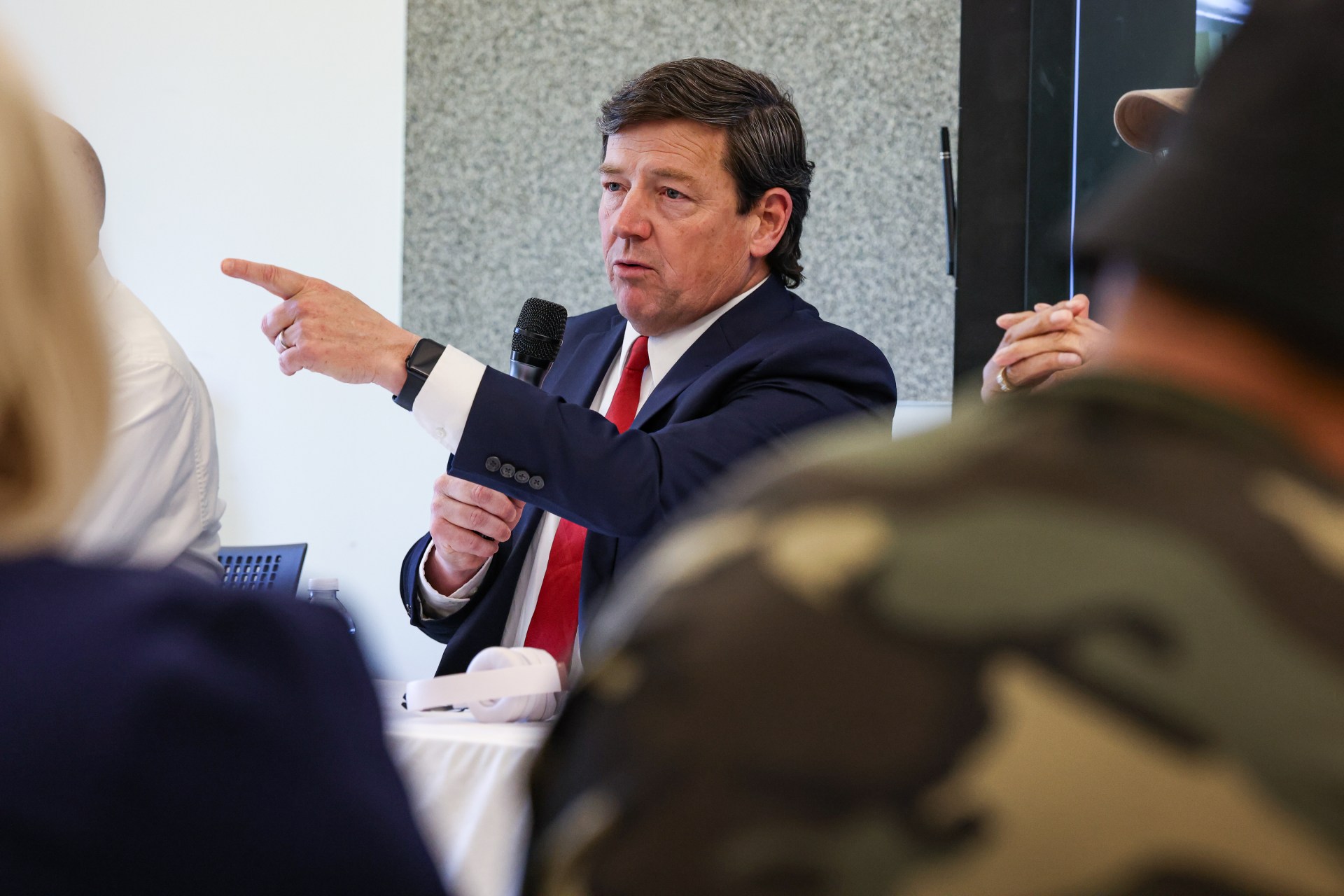
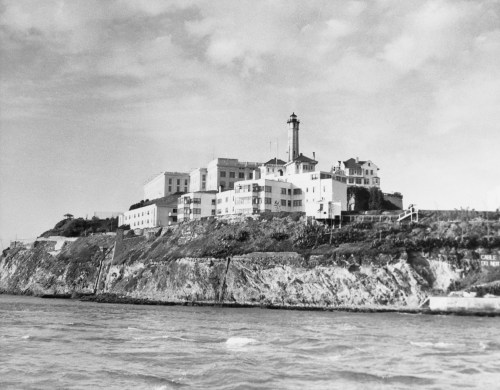
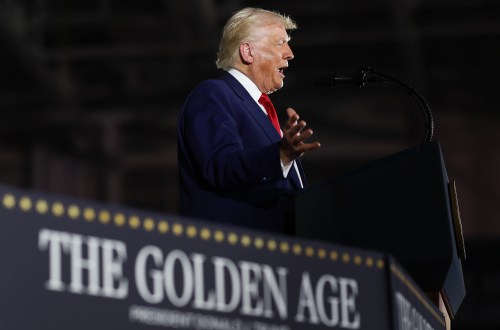

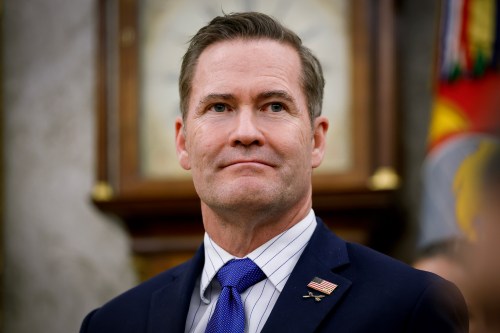





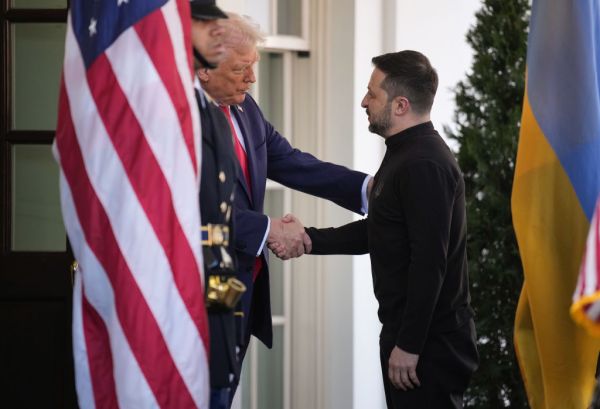



Please note that we at The Dispatch hold ourselves, our work, and our commenters to a higher standard than other places on the internet. We welcome comments that foster genuine debate or discussion—including comments critical of us or our work—but responses that include ad hominem attacks on fellow Dispatch members or are intended to stoke fear and anger may be moderated.
With your membership, you only have the ability to comment on The Morning Dispatch articles. Consider upgrading to join the conversation everywhere.